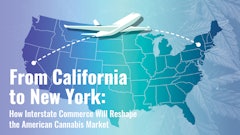
Facebook has been blocking cannabis-related pages from showing up in its users’ search results, but last week, the social media giant announced that it will make the verified pages of cannabis businesses searchable again. While the move is certainly encouraging, some industry stakeholders say the platform still has work to do to clarify its policies to users and accept cannabis companies on its network.
“The way that I’m interpreting it is that you will be able to search for cannabis-related companies, [but] I don’t know if that’s actually going to alleviate any of the issues with cannabis-related companies getting flagged and shut down,” Cannabrand CEO Olivia Mannix told Cannabis Business Times.
And it is important to note that only pages that have been verified through Facebook’s verification process and have a badge on their profiles will display in users’ search results—all others will continue to be blocked, and users will need direct links to the pages in order to access them.
“It’s very difficult to get verified,” Mannix said. “And verification is still contingent on Facebook’s laws and regulations. So, it’s still always in their control and hands.”
However, verification gives businesses a level of professionalism on Facebook, and cannabis companies should make an effort to become verified, according to Amy Donahue, founder and social media consultant with Get Hybrid Social.
“I don’t understand why anybody wouldn’t verify their page,” she said. “To me, every business should be verified on Facebook anyway—that just makes you look more professional. … And if that’s what Facebook wants, then sometimes we have to appease the gods and do what they say.”

Facebook-verified pages also symbolize legitimacy to many consumers, according to Justin Simon, founder and executive producer of Cannabest Productions, a producer of marketing and promotional videos for the cannabis industry. “Whether or not that may be true on the outside, there is some consumer bias toward that,” he said. “So, when a consumer is looking into companies that they might want to purchase from and maybe they don’t have a website and they want to check out their social media, comparing two equal companies where one is Facebook validated and one is not may be enough to sway them toward the verified company.”
Although Facebook’s motives are unclear, some in the industry think this sudden shift in policy stems from Canada’s legalization of cannabis, which went into effect last week.
“Having Canada legalize is going to create a domino effect in a lot of ways for some things that we’re seeing,” said Francesca Vavala, co-founder and marketing director with Alias Cann, a cannabis sales and marketing outsource company. “There will be good and bad fallout from it, and advertising on social is one of the things that will be put into play, for sure.”
“I think they’re seeing that the dam has broken,” Simon added. “Canada is legal [and] big states are flipping … with more on the November ballot. … Facebook has really two options. One, either stay with their head in the sand and pretend, ‘We’re just going to wait until everybody’s on the train,’ or do what a technology company should do and … be on the early wave of it and say, ‘Look, these are legitimate companies, some with giant market caps, and to ignore them and pretend that they’re not out there is ludicrous, so we’re going to show you their pages.”
So far, Facebook has not been entirely clear on its policies, which adds a layer of overall confusion for cannabis companies.
“Whether those bylaws have changed particular to Canada, I think there’s still a ton of gray area,” Mannix said. “How [can Facebook] regulate [based on] where companies [are located]? Where are they selling to? How much time and money is Facebook going to invest into verifying? It would take a whole team of people at least for all the businesses that are popping up. Again, it’s a gray area.”
And some industry stakeholders have not seen any change since Facebook’s announcement, according to Cannabiz Connection founder Jamie Cooper. "Unfortunately, with my clients, I have not seen any positive changes since they made the announcement on any of my pages or my client pages," she said. "I haven't seen any difference. I think it would be nice if Facebook did clarify with our industry exactly what that means because I feel like their comment about it was pretty vague. … If Facebook was more open and consistent with their policy, then there would be more understanding within those in business about what we are allowed and not allowed to do.”
Overall, Facebook bases its policies on federal guidelines, meaning that it views cannabis as an illicit substance, even though many U.S. states have legalized and regulated its use.
“Honestly, I think that they’re finally starting to understand that the industry is here and it’s not going anywhere,” Donahue said. “Unfortunately, Facebook, which also owns Instagram, works within federal guidelines. So, even if it’s legal in your state, they still go by the feds.”
Another piece of Facebook’s war on cannabis pages could be the stigma attached to marijuana, Donahue added. “The more professional we present ourselves online with professional Facebook pages, the more that stigma is going to be shot down.”
But even with this slight shift in policy, many cannabis businesses remain blocked in searches, and paid advertising remains off-limits for cannabis-related companies.
“There are two digital strategies for being able to raise your awareness [and] to gain new followers,” said Markyr Digital’s Kyra Reed. “One is organic, and one is paid. Paid is out of the question for any of us, so we’re left with organic. The shadow ban has really decreased our ability to increase our organic reach on Facebook. Lifting that ban is going to give us a little bit more breathing room than we’ve had the past few months to spread our content even though we can’t spread our ads.”
The ban has blocked many cannabis-related groups from users’ search results, which has drastically slowed their growth.
“It has put a full stop on any of our community growth,” Reed said. “My understanding is that everybody’s just come to a grinding halt when it comes to growing their community organically. Then, couple that with the fact that we can’t advertise anywhere, and it makes it really difficult.”
“It’s made a huge impact because you used to be able to search for groups, and these groups can serve as a very powerful resource in helping a business build community,” Cooper agreed. “All of a sudden, you would type it into the header, and they didn’t appear, and those groups have really stopped building the way that they were.”
“It is detrimental because people come to marketing agencies and people like Cannabrand to help them build their brands, build their awareness,” Mannix added. “Their pages are really important to be able to spread awareness about [their] brand or company, about speaking to [their] patients if [they] are a dispensary or collective, so it has been really difficult. We’ve had a lot of our pages shut down, and it’s still a huge issue.”
The bottom line: Facebook still views cannabis as an illegal substance, and until that changes, cannabis businesses will continue to face pushback.
On the other hand, Twitter and LinkedIn have been fairly open to cannabis-related pages and other cannabis-specific social networks, like Duby, have launched to serve the cannabis industry.
“I wish that we gave LinkedIn more credit because they allow cannabis conversation to flow,” Reed said. “They allow cannabis content to be posted. They don’t ban anybody. They don’t hide anybody. They’re probably the best place to connect with other cannabis professionals.”
However, Facebook remains the coveted platform for most businesses.
“The great thing about Facebook is it allows that sense of community, which you can’t really get anywhere else,” Reed said.
“Facebook is still the 800-pound gorilla in the room, and when you can advertise your company and develop a social media presence in a community and gain followers that way, that’s a huge help toward not only branding, but sales,” Simon added. “So, not being able to be found, not being able to be indexed, is simply harmful to your business.”
RELATED: 7 Social Media Tips for Cannabis Businesses
Access to a digital presence on platforms like Facebook help companies build brand awareness, and users having the ability to search for cannabis businesses on mainstream platforms give businesses increased exposure to potential customers who may not want to walk into or call a dispensary.
“It’s a way to generate new clientele, to get your product in front of new eyeballs and to develop a social following,” Simon said. “And not only from a standpoint of your standard likes and engagements, but an actual community, and the cannabis community has shown to be tremendously supportive of their own. … So, having access to build those communities and really access your potential client base out there is huge.”
“It’s saying this isn’t something scary and this isn’t out of a basement and this isn’t a side gig,” Vavala added. “This is a real thing that has an economic impact, medicinal impact, incredible benefits for the general public if we can get them to become more educated, and I think we can get them on our side. So, in my mind, having these businesses being able to be searched and then verified, helps move that agenda along.”
And until Facebook and other social media platforms fully open their doors to cannabis companies, the industry is celebrating this little victory, but hoping it leads to further change.
“I think this is a first step,” Vavala added. “It’s like dipping the toe in the water and then saying, ‘OK, what happens if we do this? What’s the pushback on it?’ And then seeing how their customer base reacts to it and going from there.”
While Canadian legalization and even state-level legalization may make social media networks more comfortable with the idea of cannabis, it may take time for them to craft new policies around it, Vavala added.
“Nobody wants to be first in a lot of ways when you’re [a] big enough [company], so it’s very hard for something that’s a behemoth like Instagram or Facebook to pivot and allow things that nobody else is allowing,” she said. “So, I think it’s a little bit of, ‘You go first. No, you go first.’”
In the meantime, cannabis companies with a social media presence should read and understand the rules of the platforms, and file appeals if their pages are shut down while they were following the rules, Donahue said.
“If you have the right content that’s following community standards and terms of service, it’s much easier to get your account back,” she said.
And overall, the fact that a mainstream social network like Facebook permits cannabis-related accounts at all should be encouraging for the industry, Vavala said. “I think having this social platform that is so widespread and so multi-generational normalize it as a business and an industry is a good milestone for us to reach as cannabis entrepreneurs.”
“It’s a work in progress, and I think we need to be using our voices and we need to continue fighting with Facebook,” Cooper added. “We’re still against a very big battle.”
Top photo courtesy of Adobe Stock
























